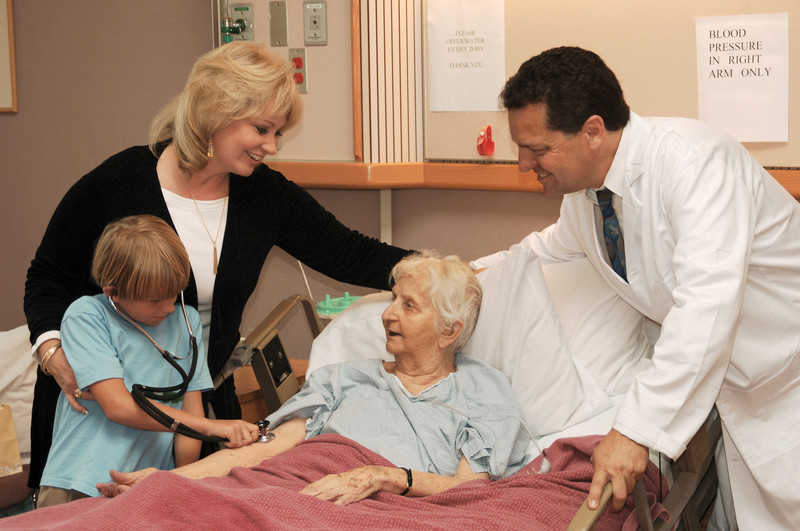Preparation and Tips to Make a Stay Easier
Sooner or later, there is the potential of Mom and/or Dad possibly taking a trip to the hospital. Whether it is planned or unexpected, a hospital stay is not something that our parents look forward to.
In an emergency, everyone is panicked. There can be a tendency to just “go” without another thought as to what will be needed on the other end. If you are with your parent in an emergency, here are some items to bring with you:
- Medical History is a necessity; begin keeping a diary/log of as much of your parents’ medical history as possible. This is especially important if a hospital stay unexpectedly happens while out of town.
- A thorough listing of all medications they may be taking, both prescription and over the counter medications
- A robe and slippers
- A warm blanket, warm socks and hot water bottle — Emergency rooms can be drafty, gurneys can be cold!
- A notepad to take notes. While waiting, write down all your thoughts and recollections of the events leading up to this emergency, as well as notes from the doctor’s evaluation
- If you are not Durable Medical Directive Power of Attorney, notify this individual immediately
- Any legal document such as a Power of Attorney to authorize you to make decisions on behalf of your paren8
- Remove all jewelry from their person, as to protect them against theft or it becoming damaged
If Mom or Dad need to stay in the hospital, many of the above points certainly apply, but here are a few extra hints:
- Make sure Mom or Dad have: Toothbrush, toothpaste, comb, brush, moisturizer, dentures, denture adhesive, eyeglasses, hearing aids, shaving supplies, mirror, etc.
- Bring a bottle of body cream or lotion. Skin can get dry during hospital visits
- Extra underwear, warm socks, blankets
- Reading materials, like magazines and books with large print.
- A cell phone with stored numbers. including the phone charger
Visiting:
- Keep family visits frequent, but brief. It is likely if Mom or Dad are in the hospital, they are there to rest. In addition, try to keep a minimum of visitors in their room at one time. Speak slowly, softly, and calmly.
- Remember also, everyone handles their parent being ill differently, and thus, do your best to keep family conflicts to a minimum. Your parent needs comfort and peace to recuperate, above all else. If there are volatile situations in your family, notify hospital staff and make them aware. The primary interest is to make sure above all else that your parent is protected and in a peaceful situation.
- Keep perfumes, cologne to a minimum. Don’t overpower their room with your own strong fragrance.
- Upon arrival, check water in flower vases. Water should be changed in fresh flowers daily. If there are cards to hang on the wall, hang them. Make sure to check your parent’s water bottle, etc. Find out if there is something you can do to make them a bit more comfortable.
- Once their meal comes, it is a good idea, if they can feed themselves, to excuse yourself. Don’t make your parent feel bad about eating in front of you. Their nourishment is most important.
- Wash your hands frequently and often. Most hospital rooms have disinfectant to use, and thus, make sure you don’t come into contact with your parent until after you thoroughly wash your hands.
If you live out of town and cannot visit, send cards. Seniors come from the generation where snail-mail cards mean a lot more than they do to younger generations. Know that every time you send a card to your distant elder loved one in a hospital, that when it arrives, it will brighten their day. In many cases, check the hospital website. In many cases they may have an online card service that you can create, and they can deliver directly to them.
Finally, Contact their clergy, and if in alignment with your parent’s wishes, arrange a visit from their outreach ministry.
In addition, if your parent belongs to any other types of social friends, groups, or organizations that they are a part of to get the word out. Make sure you share your wishes- whether it is just to send your parent cards, or for visits. People appreciate parameters around visiting and what would be most helpful for your parent’s recovery.
What to bring on your visit?
- Find out from the hospital staff what your parent’s dietary requirements are during their stay. If permitted, a small treat like ice cream, home made dish, or their favorite candy can be a very welcome treat. Hospital food isn’t the most exciting thing in the world.
- If bringing flowers, make sure to check with the hospital staff that flowers are permitted. In many types of situations, including ICU, flowers are not allowed. If bringing flowers, make sure they are not overwhelmingly fragrant. Stay away from flowers that have heavy pollen that can interfere in the air quality of the room.
- For most seniors, their families; children, grandchildren, and great-grandchildren are precious. Find pictures of each family member and paste it on a piece of paper. Include a personal dictated note from each. This might include special memories, or special notes of significance that your parent can find encouragement. Paste them on the wall so that your parent can always see them.
- Magazines, Books, Cards and Music can also be comfortable and help them pass the time.
Most importantly, take care of yourself. As your parent’s caregiver, regardless if the hospital stay is planned or not, you need to take the time to go home and rest. You may very well be keeping long hours caring for them upon their release. Ask friends, siblings and other family members to visit, giving you that badly needed time.
Notify your employer, and remember that the Family Medical Leave Act can protect you from losing your job or position if you have to lose time from your work in order to care for your parent.
Investigate preventative herbal remedies, like Airbornne™. Get plenty of rest, and make sure you take a good multi-vitamin.
Ask for, and allow your own friends and family to support you during this time. It is at times like these, as you may be living day to day on your beloved parent’s outcome that you need nurturing. It’s often difficult when you are a caregiver and always the one caring for others to finally let go and allow others to help. This is the time to let them in.
Remember: Our Decision Guide can help you in times like this. Check it out as developments arise. It can help give you the facts and information about your options, and help you to not only make the right decision, but feel empowered doing so in the process!
By John Detrich









